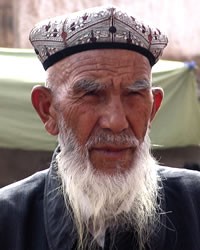Uyghur in United States

Photo Source:
J4J2025
|
Send Joshua Project a map of this people group.
|
| People Name: | Uyghur |
| Country: | United States |
| 10/40 Window: | No |
| Population: | 10,000 |
| World Population: | 12,284,400 |
| Primary Language: | Uyghur |
| Primary Religion: | Islam |
| Christian Adherents: | 0.00 % |
| Evangelicals: | 0.00 % |
| Scripture: | Complete Bible |
| Ministry Resources: | Yes |
| Jesus Film: | Yes |
| Audio Recordings: | Yes |
| People Cluster: | Uyghur |
| Affinity Bloc: | Turkic Peoples |
| Progress Level: |
|
Introduction / History
The Uyghur are a Turkic people whose home is primarily in northwestern China. Their origins can be traced back to Turkic nomads who lived in Siberia. They became independent of the Turks in 744 AD, but they were forced to leave their homeland in 840 AD. It was then that most of them immigrated to western China, where in modern times they have resided in China's Xinjiang Uyghur Autonomous Region. China has chosen to use "Xinjiang" to designate the Uyghur region. The Uyghur people, though, prefer to use "East Turkestan" as the name of the area where they have lived for centuries. There is significance to these names. The Chinese name implies that it is part of China. East Turkestan implies that it is separate, and it emphasizes their Turkic roots. Uyghur literally means "allied. " For centuries, the Uyghur were an important link between China and the rest of the world. They lived along the legendary Silk Road and worked as caravan drivers transporting Chinese goods. The strategic locations of their homes allowed them to be the "middlemen" between East Asia and Europe. One can find significant diasporic communities of Uyghurs in the Central Asian countries of Kazakhstan, Kyrgyzstan, and Uzbekistan. Smaller communities live in other countries, including Afghanistan, Australia, Belgium, Canada, Germany, Norway, Russia, Saudi Arabia, Sweden, the Netherlands, Turkey, and the United States. In recent years the Chinese government has turned the Xinjiang Uyghur Autonomous Region into a police state, in essence imprisoning Uyghur people in huge "re-education" camps. Families have been separated, with many children removed from their parents and taught to think like the Han Chinese. China essentially seeks to destroy the Muslim Uyghur culture, including the use of the Uyghur language and the practice of their Islamic faith. The goal seems to be the forced assimilation of Uyghurs into the Han Chinese-dominated society with no separate identity or culture, and with the Han Chinese in control. In years past, there have been extremist Uyghurs wanting to separate from China. The Chinese appear to have used the threat of Uyghur separatist violence as an excuse to carry out the cultural genocide against the Uyghur people. For this reason, there are Uyghurs who have fled to the US.
What Are Their Lives Like?
Uyghurs began to arrive in the US in the 1960s, but even now there are not that many in the US. The 2010s was a decade when more Uyghurs came to the US because of a crackdown by the Chinese government. The few who have been given refugee status are in Washington DC, Houston, Los Angeles, and New York. They have their own associations, most notably the Uyghur American Association. Recent arrivals must learn a new language and get jobs that usually are not as lucrative as what they had in the old country. All the while they must carry the burden that comes from knowing their Uyghur relatives in China are in harm's way and there is nothing they can do about it. If they dare to criticize the Chinese government in the US, there are people who will take their pictures and if possible, report them to the Chinese government. When that happens, their relatives are in danger of government retaliation. Singing and dancing are important activities at Uyghur cultural events. They play stringed, wind, and percussion instruments. The Mukam ("Twelve Great Melodies") have been part of Uyghur culture for many centuries. They can enjoy their culture and try not to remember their hardships.
What Are Their Beliefs?
Sunni Islam has been the dominant religion of the Uyghur since the tenth century. In the past, they were Muslim in name only; however, there is some renewal that is currently taking place among them since Islam is a rallying point for their struggle to maintain their culture. Since they are new in the US where there is religious freedom, there is the possibility for believers to take Christ to them.
What Are Their Needs?
New Uyghur arrivals in the US need language and job training. Believers can spend time with them conversing in English and keeping an eye out for job opportunities. Others can attend Uyghur cultural events and learn to appreciate their art and music and make friends with these vulnerable Muslims.
Prayer Points
Ask God to raise up prayer teams who will break up the soil through faithful intercession. Pray that the Lord will send loving ambassadors of Christ to the Uyghurs in the United States. Pray for the Holy Spirit to anoint gospel radio broadcasts for Uyghurs and give them hearts willing to listen. Pray for effectiveness of the JESUS Film among the Uyghurs in the United States. Pray the Lord raises up strong local churches among the Uyghurs leading to unstoppable movements to Christ.